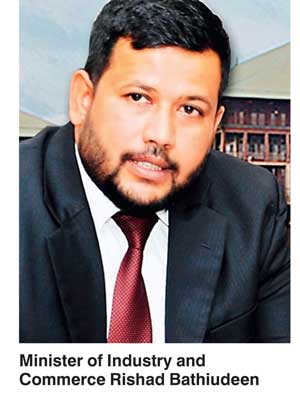Wednesday Feb 25, 2026
Wednesday Feb 25, 2026
Friday, 12 August 2016 00:01 - - {{hitsCtrl.values.hits}}
 Frustrated by arbitrary rates levied in its growing public taxi system, Sri Lanka is finally stepping in to rein in on errant taxis, with no less than an announcement in Parliament on 10 August.
Frustrated by arbitrary rates levied in its growing public taxi system, Sri Lanka is finally stepping in to rein in on errant taxis, with no less than an announcement in Parliament on 10 August.
“Today people have become highly dependent on various three wheelers and taxi services but often the passengers are cheated and they pay higher than usual rates,” said Minister of Industry and Commerce Rishad Bathiudeen.
Minister Bathiudeen was moving regulations CE No. 1921/54 of July 2015 under Measurement Units, Standards and Services Act in Parliament. Tabling his speech that detailed the performance of Measurement Units, Standards and Services Department (MUSSD) under his Ministry which is in charge of taxi meter regulation as well, he stressed that MUSSD, as the apex national institution, is in charge of national measurement standards across a wide spectrum of activities, and has decided that it is time they step in to inspect public transport fee levying as well to safeguard the passengers.
Taxi meters are fitted in many of the more than one million taxi collective – both three wheelers and four wheelers – in the country, the bulk of which consists of three wheelers.
As of 2014, more than 929,000 three wheelers were active in the public transport system.
“Today people have become highly dependent on various three wheelers and taxi services but often the passengers are cheated and they pay higher than usual rates. Realising this, I am pleased to inform that the MUSSD is proposing a project to set up a Verification Center of Taxi Meters of Sri Lanka,” said Minister Bathiudeen.
“This project has been proposed to facilitate people with an accurate and reliable travel fare counting system of taxi meters of which the accuracy must be verified. We already started pattern approval for manufacturers and importers under French OMIL regulations of which this Department is a proud member. Through this the metrological parameters related to taxi meters are controlled. Same as every other measuring instrument used in trade the legal control of taxi meters will comprise four components; the pattern approval of the meter initial verification road test after the installation of the meter and annual verification.
“It has been planned to appoint a staff consisting a technical officer and a supporting officer to assume duties on taxi meter verification and inspection covering all the districts. The construction of a taxi meter verification centre consist of all the facilities required to verify and grant approval of the pattern of such meters which are mounted in taxis and installation of necessary measuring instruments for the centre have to be completed. It is expected to initiate granting pattern approval of taxi meters as a pilot project in 2016. Accordingly it will be possible to provide necessary facilities for obtaining the pattern approval to the institutions who import and distribute taxi meters by mid-2017,” he added.
MUSSD is responsible to ensure that Sri Lanka’s measurements are in par with international standards.
To this end, MUSSD works with International Organization of Legal Metrology (OIML), Asia Pacific Metrology Programme (APMP), International Committee of Weights and Measures (CIPM) and Mutual Recognition Agreement (MRA).